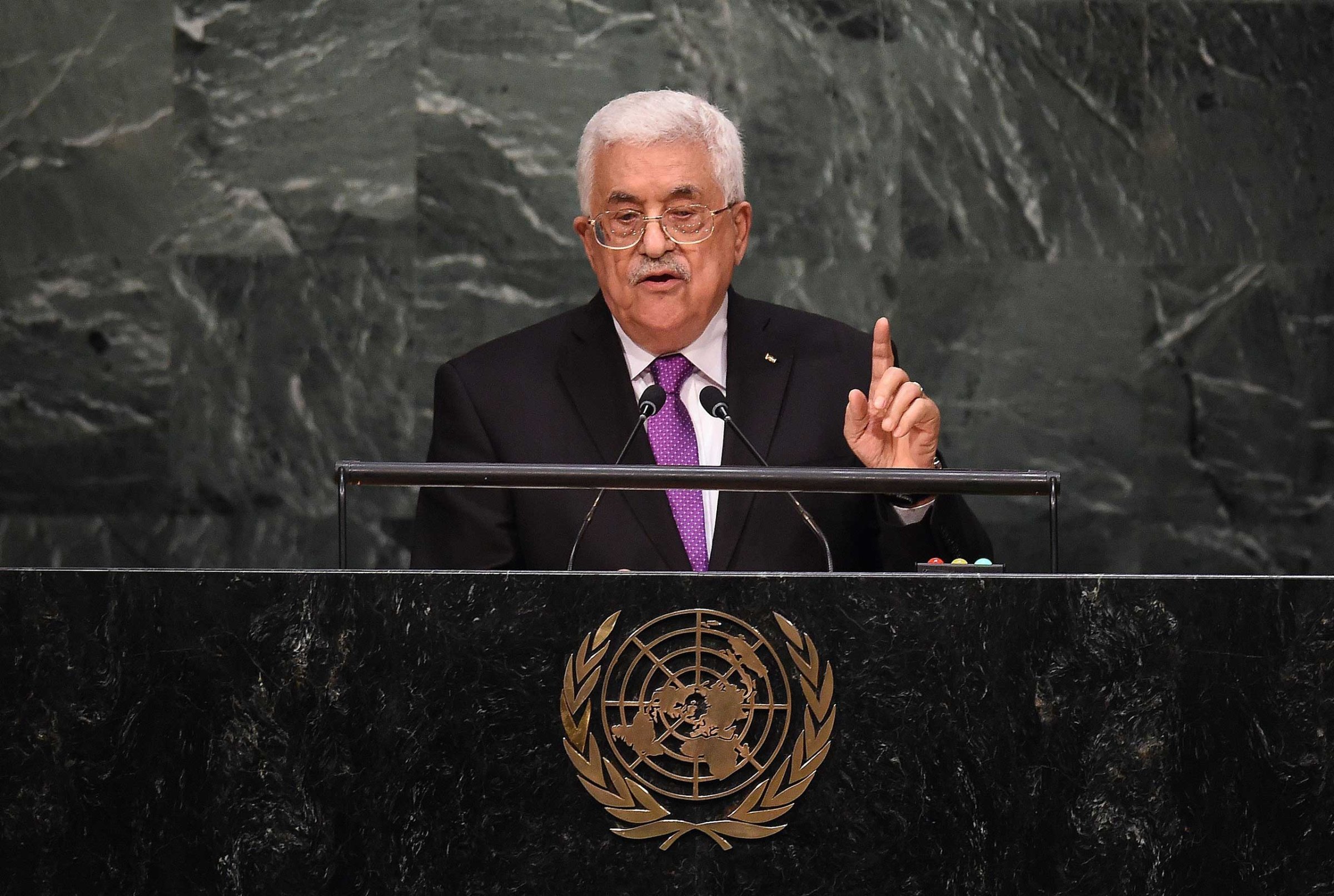
On Monday, President Obama delivered a speech at the United Nations that touched on world events like Syria and Ukraine—and made no mention of the Palestinians. Which may be all you need to know about the speech delivered on Wednesday by Mahmoud Abbas, the president of the Palestinian Authority, in which he appeared to blow to smithereens the ostensible architecture for a lasting peace with Israel, the close U.S. ally that claims the same land as the Palestinians. From Abbas’ speech:
Thus, we declare that as long as Israel refuses to commit to the agreements signed with us, which render us an authority without real powers, and as long as Israel refuses to cease settlement activities and to release of the fourth group of Palestinian prisoners in accordance with our agreements, they leave us no choice but to insist that we will not remain the only ones committed to the implementation of these agreements, while Israel continuously violates them. We therefore declare that we cannot continue to be bound by these agreements and that Israel must assume all of its responsibilities as an occupying Power….
It sounds dramatic, and it’s supposed to. But at this point is it is only rhetoric, a flourish intended to regain the attention of the world of diplomacy, which is the one and only arrow in Abbas’ quiver. He made no mention of proceeding to the moves that would actually undo the accords—namely, disbanding the Palestinian National Authority that pays his salary, and the 154,000 other salaries that drive the economy of the West Bank and Gaza Strip. Nor did he abrogate what is carefully referred to as “security coordination” with Israel, the intelligence sharing with the “occupying power” that keeps both terror attacks against Israelis and Abbas’ biggest rival, Hamas, in check. Absent those concrete moves, or something similar, the speech was little more than a strongly worded complaint.
“As it currently stands, the only remaining vestiges of the Oslo Accords are the Palestinian Authority itself and its provisions that keep Palestinians trapped in heavily policed bantustans,” former Abbas advisor Diana Buttu said in a statement after the speech, referencing the “homelands” where the white South African government confined the nation’s black majority during the apartheid era. “The other elements of Oslo, namely direct negotiations with Israel, were undone by Israel years ago. While Abbas says he’s no longer bound by Oslo, on the ground nothing will change.”
A phlegmatic and earnest leader, who distrusts personal popularity, Abu Mazen, as Abbas is widely known, has built his career by eschewing the violence that long defined the Palestinian nationalist cause, and by some accounts achieved its only gains to date—forcing Israel to the negotiations that produced the 1994 Oslo Accords, which promised Palestinians a state of their own on the hills of the West Bank of the Jordan River and the crowded beachside enclave called the Gaza Strip. The accords set up the Palestinian Authority, but only as a temporary arrangement, intended to transition into actual statehood after just five years.
That never happened. An Israeli right-winger assassinated Yitzhak Rabin, the prime minister who had negotiated the accords with Abbas’ charismatic predecessor, Yassir Arafat, and Palestinian militants, sometimes with support from Iran, in 2000 ignited waves of suicide bombings that over the next five years became known as the Second Intifada. The peace process never recovered, even after Palestinians elected Abbas on a platform of non-violence and negotiation.
Israelis felt like suckers for getting their hopes up over Oslo, while Abbas has repeatedly been cast by critics as the pawn of either Washington (which strongly supported his ascension) or Israel, or both. He lost control of Gaza when Hamas won parliamentary elections following Israel’s 2005 withdrawal from the enclave and he has been unwilling to translate widespread international support for statehood beyond the realm of the symbolic. The big achievement this year was getting the Palestinian flag raised outside U.N. headquarters for the first time. That doesn’t mean much at a moment when Palestinians remain barred from 40 percent of the West Bank by Israeli settlements, Israeli forces mount nightly raids on homes, and, as Abbas complained in the UN speech, the government of Prime Minister Benjamin Netanyahu cuts off the flow of dollars from donors to the PA whenever it wants to punish the Palestinian leadership.
Meanwhile, Abbas’ nemesis, Prime Minister Benjamin Netanuyahu named as Israel’s ambassador to the UN a right-wing politician, Danny Danon, who has written a book proposing that Israel simply take most of the West Bank, where it has established more than 200 Jewish settlements, and leave Palestinians just the cities like Ramallah, where the Palestinian Authority is based. The appointment amounted to a reaffirmation of Netanyahu’s campaign statement renouncing negotiations. And it came despite a wave of brutal settler attacks on Palestinians, including an arson that killed an 18-month-old and his father—attacks that Abbas’ railed against in his U.N. speech.
On the home front, the latest, most credible public opinion poll, taken in mid-September, found two-thirds of Palestinians saying Abbas should resign. A 57 percent majority voiced support for a returned to armed struggle. In advance of his UN speech, Abbas had promised to “drop a bombshell” before the General Assembly. It may not be the kind his countrymen have in mind.
More Must-Reads from TIME
- Cybersecurity Experts Are Sounding the Alarm on DOGE
- Meet the 2025 Women of the Year
- The Harsh Truth About Disability Inclusion
- Why Do More Young Adults Have Cancer?
- Colman Domingo Leads With Radical Love
- How to Get Better at Doing Things Alone
- Michelle Zauner Stares Down the Darkness
Contact us at letters@time.com